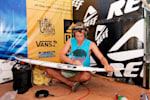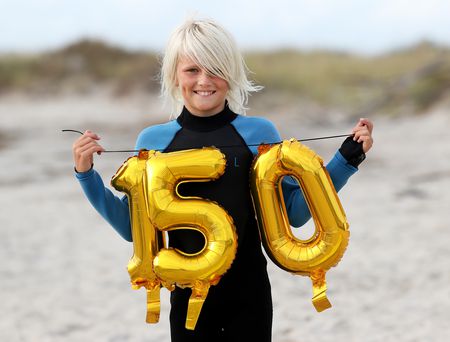Related Story: Living with Type 1 diabetes and its misconceptions
Related Story: Vascular disease link to type 1 diabetes in youth
It’s a sunny day, with a light breeze and small waves, and Wayne Hudson is in the ocean with a group of happy and excited young surfers.
It’s how the easy-going surf coach, a local identity commonly known as Huddo, spends many of his days — and he wouldn’t have it any other way.
“It’s one of the best offices in the world,” he said.
“If you were a professional surfer, surfing amazing waves all the time, that might cap it for me, but it’s a very close second best.
“I have been doing it for 15 years and I’m enjoying it — I think if you can last that long in your own business, it’s a good testament to how good the office is.”
A natural transition
Mr Hudson started his surf school business with his father, Peter, in Port Macquarie on the New South Wales mid north coast.
He had been competing in the world qualifying surfing series when he decided to return home in 2001 and focus on creating the school.
“My Grandad surfed, my Dad surfed, and I surfed, so it was a natural transition,” he said.
“Dad was a very good surfer and a really good coach, and my brother and I did the pro junior series in Australia, and I then did an environmental science degree with honours.
 Photo: He loves sharing his passion for surfing with others — this family all loved their first lesson together. (ABC News: Emma Siossian)
Photo: He loves sharing his passion for surfing with others — this family all loved their first lesson together. (ABC News: Emma Siossian)“I gave the world qualifying surfing series a go and travelled around Australia, France, Portugal, Spain, South Africa and Japan surfing in comps.
“I was third or fourth year into the tour and Dad said: ‘Do you want to start a business?’ It was the right time.
“I thought, ‘Wow, I have the opportunity to teach people what I love’, and it was perfect — I jumped into it and have been going ever since.”
Riding the waves with diabetes
Life isn’t always easy for Mr Hudson, who has type 1 diabetes, and when he was younger was told his life would be very restricted.
“I’ve been a diabetic since I was seven years of age, and diabetes is hard, and the stereotype for diabetics is hard,” he said.
What is type 1 diabetes?
- When someone has diabetes, their body can’t maintain healthy levels of glucose in the blood
- Type 1 diabetes is a condition in which the immune system is activated to destroy the cells in the pancreas that produce insulin
- It is one of the most common chronic childhood conditions and can’t be prevented
- Type 1 is managed with insulin injections several times a day or the use of an insulin pump
- There are three main types of diabetes: type 1, type 2 and gestational diabetes
- Diabetes can be managed well, but potential complications include heart attack, stroke, kidney disease, limb amputation, depression, anxiety and blindness
“When I was younger I was told I would never be able to surf, never be able to lifeguard, never be able to do a lot of sports.
“But it’s like anything, it’s how you manage yourself — you manage what you can so you have a successful life.”
It was a tricky balancing act but could be done, he said.
“It’s not easy being a diabetic and managing a very fluid work environment and surf lessons, but the more knowledge you have about your body and diabetes, the easier it is to manage it.
“When I grew up I found out as much as I could about what foods to eat, how my body works — the more you know about that, the easier it is to make sure your sugar levels are correct.”
Happiness in the success of others
 Photo: The coach says he loves seeing kids achieve success in the surf. (Supplied: Port Macquarie Surf School)
Photo: The coach says he loves seeing kids achieve success in the surf. (Supplied: Port Macquarie Surf School)Mr Hudson said he loved to see children and adults progressing and embracing the outdoors.
“Whether they surf and stand up and ride a wave and do a turn, as long as they are out and active in the environment, it’s great,” he said.
“I grew up in the ocean and to see other people enjoying it is amazing.”
He is an enthusiastic coach, cheering people on when they catch a wave, and there are many happy faces emerging from the water.
Mandy Robertson and her family took their first surfing lesson together.
“It was great fun. We had a good time as a family — it’s been on my bucket list for a long time, so it was nice to tick it off,” she said.
It’s not all waves and sunshine
 Photo: Wayne Hudson does have to carry a lot of surfboards up and down beach stairs each day. (ABC News: Emma Siossian)
Photo: Wayne Hudson does have to carry a lot of surfboards up and down beach stairs each day. (ABC News: Emma Siossian)Teaching people to surf for a living certainly has its perks, but like many outdoor jobs, not every day is easy.
“There’s days the surf is pumping and I have to videotape,” Mr Hudson joked.
“My job is amazing, but on a wet, cold, windy day, when I am carting 40 surfboards up to the trailer, up the 38 beach stairs, it’s not ideal.
“I get up at 5:00 most mornings to get a park close to the beach, otherwise we have to walk further with the gear, which is the last thing you want to do after you’ve spent eight hours in the water.
“Depending on the day, I will hang up and wash and rinse about 40 wetsuits and rashies.
“But let’s be honest, my office is really good … I’m not complaining, nine days out of 10 in Port Macquarie you’ve got sun and a light breeze, small waves — I’ve done worse jobs.”
Topics: surfing, people, lifestyle, lifestyle-and-leisure, charities-and-community-organisations, community-and-society, diabetes, diseases-and-disorders, health, sport, regional, human-interest, port-macquarie-2444









Recent Comments